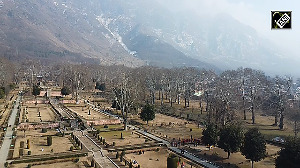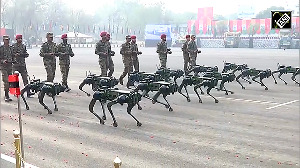'It's such a mishmash of wonderful things, so many different cultures, subsections of society and weird histories.'

Kindly note the image has only been posted for representational purposes. Photograph: Hemanshi Kamani/Reuters
UK-based artist-turned-film-maker Karan Kandhari was one of the first-time directors celebrated at the recent Cannes Film Festival. His film Sister Midnight, starring Radhika Apte, opened in the festival's Directors' Fortnight sidebar.
In Sister Midnight, a quirky, at times deliciously funny and dark comedy, Apte plays Uma, a newly-married bride who moves to Mumbai to live with her husband Gopal (Ashok Pathak) in a small room by the side of the road. The marriage is in trouble from the beginning.
Uma knows nothing about maintaining a home or cooking. The husband is almost always drunk and afraid of initiating sex.
As time passes, Uma reveals her dark desires which give the film a wildly crazy twist.
Apte is a delight to watch in the film. Screen Daily referred to Apte as 'sensational' in its review of the film.
Born in Kuwait and educated in the UK, Kandhari uses an eclectic mix of world music in the film, including Cambodian songs from the 1960s. In another unconventional film-making style, he marries live-action with stop-motion puppets used for animals.
While Sister Midnight has one Indian producer on board, Alex McAlex (Kila), and the Amazon Prime Web series Poacher), the film is mostly funded by Film4 and the BFI.
Recently, Anurag Kashyap and Resul Pookutty pointed out that nearly all the Indian films that played at Cannes this year, including the Grand Prix winner All We Imagine As Light, were funded from outside the country. The Indian government and film production houses gave no support to these films.
Aseem Chhabra spoke to Kandhari a day after the film's premiere at Cannes, and there were two things he mentioned before the interview: "Please be gentle with me" and "I am a little hungover from last night."
He added: "I don't live in India. The film happened to be set there. I am obviously Indian but I don't know much about the industry there or anything. So I am a bit of an outsider."

Karan, even as an outsider, the film gives a feeling that you have a keen sense of life in Mumbai.
I visited Bombay about 20 years ago, just after art school.
I didn't really know the city.
It has an intoxicating personality.
It's such a mishmash of wonderful things, so many different cultures, subsections of society and weird histories. All these things clashing with each other that somehow it works.
I was not being able to get the city out of my head. That was the initial seed for the film.
The character then came to me but then it took another 10 years before that sort of wordless moment pops in your head. And then, it took another 10 years to get the film made.

Can you talk about casting Radhika Apte? She's amazing in the film and I have never seen her this animated, this much fun. She's doing comedy, but it's not laugh-out-loud kind of comedy. How did you direct her?
I was struggling for five years to find the right actor.
I tried to look at films and TV shows to see who could do the role of Uma.
I couldn't find anyone, until someone suggested I should meet Radhika Apte.
So I checked a clip and as I was watching it, I was like, 'Oh my God, this woman is fearless.'
I didn't look at anything else. I was already sold and based on that, we sent her the script.
I was a little nervous when I went to meet her because if she had said no, I don't think I could have made the film. She was talking about stuff, all the things she was doing. She was scuba diving at that time.
Then she just said, 'Yeah, I loved it. I want to do it.'
So she was attached to the film for five years and we got to know each other.
We would talk around the film because many times, it was about to get made and then it got delayed.
When it got to actually doing the film, we did a lot of rehearsals. It started with just Radhika and me. She's obviously a prolific performer and has her own process.
She has a very clear idea of how to work.
Her approach was very intellectual, while I was trying to get her to be in the present because the film is very behavioral and has its own strange rhythm.
Once she got it, she said, 'My God, I have never acted like this.'
Radhika was so trusting, fearless and willing to be as silly as the film needed her to be.
Was it difficult for Radhika since she has very few dialogues?
For Radhika, it was very liberating. The role is made for her.

What about your other cast members? I know you worked with Dilip Shankar for casting. But how did you find the supporting cast, especially Smita Tambe, Chhaya Kadam (both play Uma's neighbours) and Ashok Pathak?
I call Dilip, Detective Shankar, because he works like a detective.
I was looking for actors who could leave their intellect at the door and crawl into my strange way of doing things.
So we saw lots of people.
It was a drawn-out audition process, working through scenes together and trying to find actors who could slip into that humour and rhythm because it is a strange way to perform and not everyone is going to click into it.
Tell us about the music you selected for the film.
I have an amazing music supervisor who's worked with me since my shorts.
She's my secret weapon.
Her name is Chloe Savage.
I don't have an intellectual answer for the choice of music. It was literally in my head as I was writing the film. So we pre-cleared everything.
I think the best way I can describe the music is there is a playfulness in the way we juxtaposed things -- listening to Motorhead while Uma is running down a shack, or towards the end of the film, cutting to the Buddhist monastery with nuns and you have a Marty Robbins cowboy ballad playing. It just felt right.
Also, it wasn't a conscious decision but we don't use any Indian music.
I was listening to this beautiful Cambodian soul music from the 1960s which to me, shared a similar vocal style to Indian music. The film, in a sense, is a weird cultural collage.
It's interesting when you said there is no Indian music.
It just felt right. The Cambodian stuff, when it plays in the West and people can't identify it, because all of this culture belongs to the world.
Why not mix it up?

Was the animation there from the beginning?
It was always in my mind that the animals should not be real.
I wanted something that was slightly askew.
Stop motion animation inherently has that quality, so you don't need to push it.
Also, I am not a fan of things done digitally.
A lot of the film is handmade and you can't fake light-hitting physical fur or feathers. So it was very important to have that tangible quality.
What I like about the film is that while it is set in India and the actors are Indian, it is not an Indian film. The ethos and the mood is from everywhere.
I am Indian but I think it's restrictive to say you are an Indian film-maker or a UK film-maker.
This is the only other story I have in India.
The next one is about a woman from North Shields, and it's partially set in Stavanger and Bergen (both in Norway), and then in Berlin.
That is all I can say. I can tell you what it's called because I only seem to be able to think of movie titles that are based on Iggy Pop songs.
Sister Midnight is named after an Iggy Pop song, and the next is called A Heartful of Napalm which comes from the Stooges and Iggy Pop lyrics for the song Search And Destroy. (I'm a streetwalking cheetah with a heartful of napalm/I'm a runaway son of the nuclear A-bomb).

Why Iggy Pop?
He's my hero. I listen to a lot of music as I am writing.
It's not necessary that music makes it into the film.
I was also listening to Leonard Cohen and Patti Smith. And a lot of Bob Dylan.
There's a sequence towards the end of film, when Radhika's character is being hunted by a mob.
She jumps off the roof and this lightning strikes. A couple of minutes later, two electricians cut the wires the wrong way. They think she is a goddess.
That came from Bob Dylan song called Drifter's Escape and it goes: Just then a bolt of lightning/ Struck the courthouse out of shape/ And while everyone knelt to pray/The drifter did escape.
Are there any film-makers who have influenced you?
Yes, John Walters, (Jean-Pierre) Melville, (Yasujirō) Ozu.
That's quite a span of film-making.
Ozu was a big thing for me when I was younger.
I learned the ability to observe and be still and humour also.
Look at Good Morning about the two kids who go on a silence strike because they want their parents to buy them a television set. It is really funny.












 © 2025
© 2025